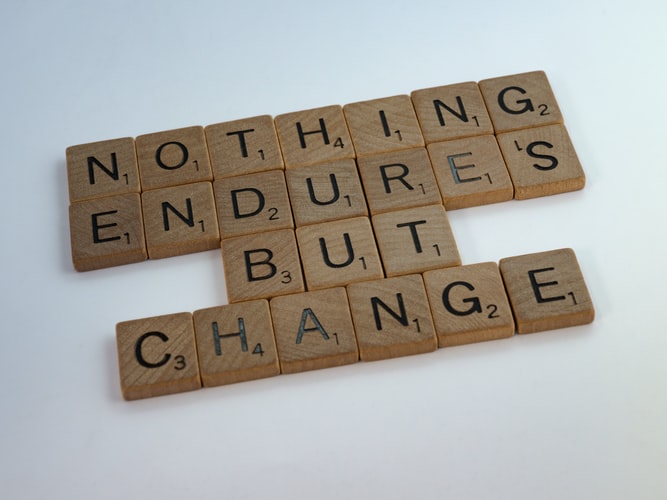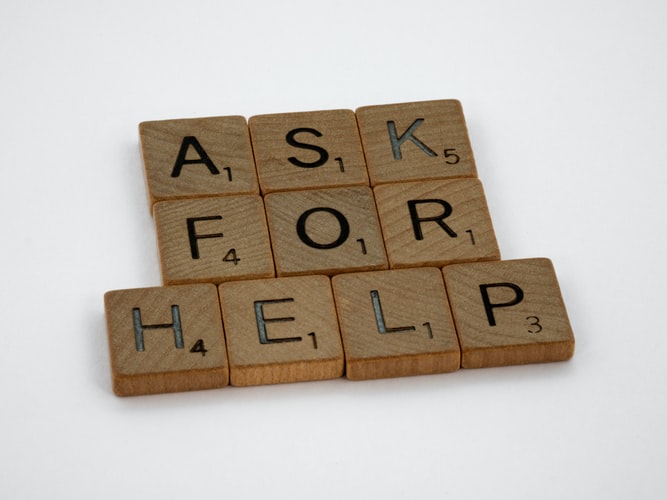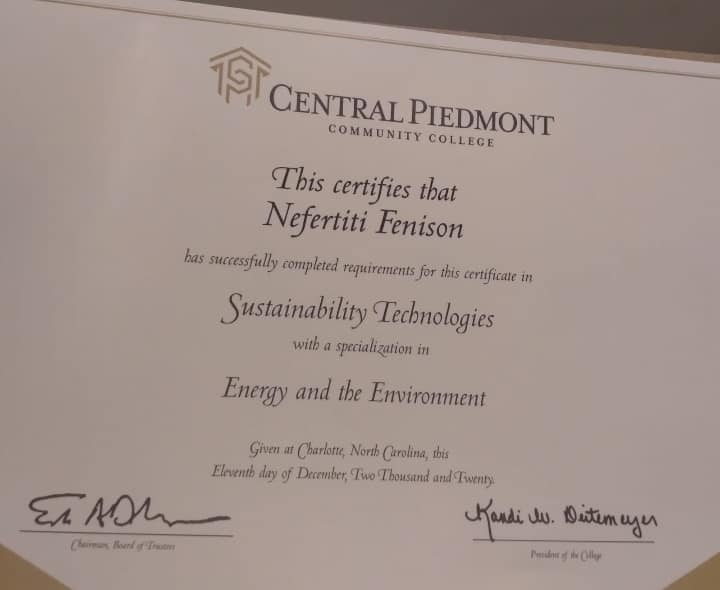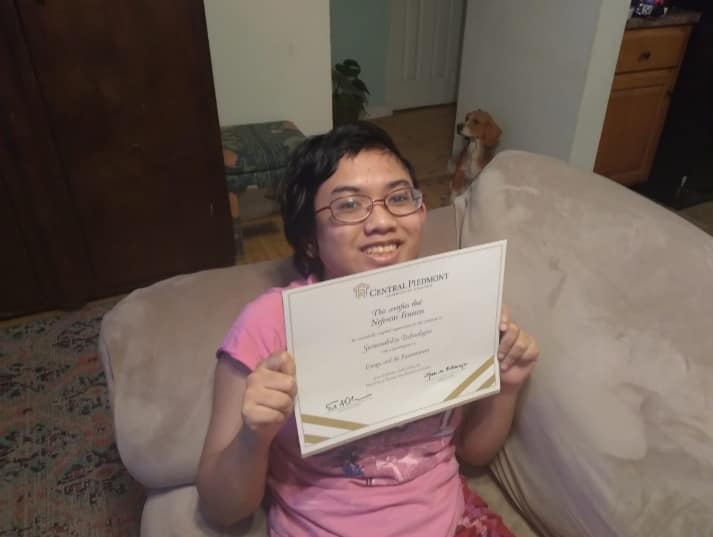
There are certain things we want and are hopeful for and yet we don’t always get what we expected. When we are expecting good things to happen and yet we encounter one bad thing after another, it can be very discouraging but what we can do is to find strength in recognizing we are not alone and that we might actually be stronger than we believe. Of course, things can go wrong and when they do it is not unusual to feel disappointed and bitter. This article is my reflection regarding my realization that sometimes we are unable to make lemonade out of lemons or find silver linings in the clouds, but it doesn’t mean whatever we are doing is going to waste. Our adversities and hardships exist to guide us into becoming resilient.
In the middle of January this year, I finally completed my certification in Sustainability Technologies with a specialization in Energy and the Environment after ten months of taking classes offered by Central Piedmont Community College. The entire program was originally planned to be mostly in-person with a few classes being taught virtually, but the situation in Charlotte, North Carolina in the midst of the Covid-19 outbreak necessitated that the plan is slightly modified. At first, I was sad about it because I was so excited to explore my campus and make new friends, but I soon realized that this is a part of the many tests life throws at us.

Picture credit: Avel Chuklanov on Unsplash https://unsplash.com/photos/DUmFLtMeAbQ
My community college went fully online for half of the Fall 2020 semester, with the other half of the semester being conducted in a hybrid of both virtual and in-person classes, with precautionary procedures in place (such as having masks indoors). For online courses, the college switched to delivering classroom instructions through a platform called WebEx. Honestly, I would have loved to attend the in-person classes, but since at that time I was not fully vaccinated yet and considering the one-hour distance between my house and my campus, I opted for the 100% online choice.
This choice proved to introduce new challenges to my learning experience. At first, I didn’t foresee any issue with that arrangement, until I had to face the harsh reality of how the nature of my disability affected how well I could do remote learning. Like in any in-person class, I ultimately had to find new ways to work around my disabilities and create a learning environment more conducive to my needs. Slowly but surely, I tried my best to communicate my worries to my instructors and together we made an effort to shift and manage our expectations.
We all face challenges during online learning and it can be emotionally taxing, especially for disabled people who might have never taken classes in an online format before. Nowadays, it is not rare for the news to highlight tips to learn remotely but there’s little to no news feature focusing on resources that can help disabled people adjust to the new normal. There were times during the ten months of taking courses at my community college when I found it extra difficult to stay motivated and continue pursuing my education because the truth is, for me personally, online classes tend to be more exhausting.
Like it or not, I have to accept that my auditory processing disorder and severe sensorineural hearing loss on both ears do make it harder for me to function in certain situations, video conferences being one of them. My hearing aid and cochlear implant do help, but the extent of how much speech I can understand varies depending on several factors, including whether or not I am able to see the speaker’s face to rely on lip-reading and whether there is more than one person talking at once (overlapping voices can confuse me). On top of that, occasionally low bandwidth can distort visuals and might even interfere with the quality of sounds, making effective communication extra challenging. Luckily for me, my lecturer agreed to work with me in figuring out a way in which everyone could communicate seamlessly.

Photo courtesy of Brett Jordan on Unsplash.
First, I told him that I found it easier to follow along with his teaching if I could see a transcript of his presentation. After knowing this, he mentioned that he would not mind sending me his PowerPoint slides before the beginning of each WebEx session. I appreciated his kind gesture and willingness to provide special assistance because having something readable in bullet point format made the class materials more accessible to me since I wouldn’t need to guess what the topic of the day was, I could just check and review the slides to get the gist of the idea. In addition to accessing slides ahead of time, I also made it clear to my lecturer that if I was quiet and not raising my hand to answer questions, it didn’t mean I wasn’t interested in actively participating, not at all. Thankfully, he understood that I had problems listening to long lectures and did not take away from my participation grade. As an alternative, he gave me extra writing assignments and optional pop quizzes to replace the credits I would otherwise be missing out on.
Secondly and perhaps most importantly, I was able to utilize the chat feature within WebEx while most others spoke verbally. My hearing loss makes it difficult for me to understand spoken words, so the chat function is useful whenever I need to ask for clarification or confirm what is being said by my classmates during a group discussion, for example. In the past, if I stumbled in understanding conversations I would ask people to repeat themselves, but I quickly realized doing so could disrupt a presenter, therefore I have made it a habit to either save my questions until the end of the meeting or leave my comments in the chat box for later so that whoever was presenting could get to them a bit easier.

Photo provided by author.
When facing difficulties learning in the same way that others do, I often feel the temptation just to pretend to be fine and let the class proceed as it normally would so as not to feel like a bother. However, I have learned that not only does my learning suffer when I do not take such preemptive steps, but often my lack of understanding that comes with this approach can create unintentional disruptions down the road anyway, with classmates and instructors not understanding what the issue is. By approaching my instructors and/or classmates from the beginning with a short and simple explanation of my disability and learning needs, often all it takes is a very small adjustment to get things right, and normally my instructors are more than happy to oblige, proving I had nothing to be afraid of.
Still, not everything went smoothly. Despite knowing that it would only hurt me if I kept on pretending I was okay in class, sometimes my doubts and insecurities won. This fear is something I am still trying to overcome and reconcile, even after my graduation from the program. I am still fighting to be a more confident person, someone with resiliency, someone who does not let what others think of her stop her from reclaiming her right to be assisted when necessary and not feel guilty about being helped. I am still learning that I do not have to appear strong and tough all the time.
Trying to stay productive in my classes in the middle of a pandemic has taught me important lessons, but one thing I will always remember from this experience is that sometimes I am my own worst critic. The obstacles I had to endure intensified when I surrendered to my fear of inconveniencing my instructors and fellow students, thus sometimes I chose to hide my struggles and not be honest. Even today, I am still battling this tendency to lie to myself and everyone else. If I could offer a piece of advice to anyone who might relate to my story, however, I would say that lying about our condition and limitations would only disadvantage us down the road. In the long run, all the lies we tell ourselves and the reliance on fake positivity will weigh us down. It is okay to be vulnerable. Being brave doesn’t mean never being scared, it means confronting whatever we find scary and not giving up.









